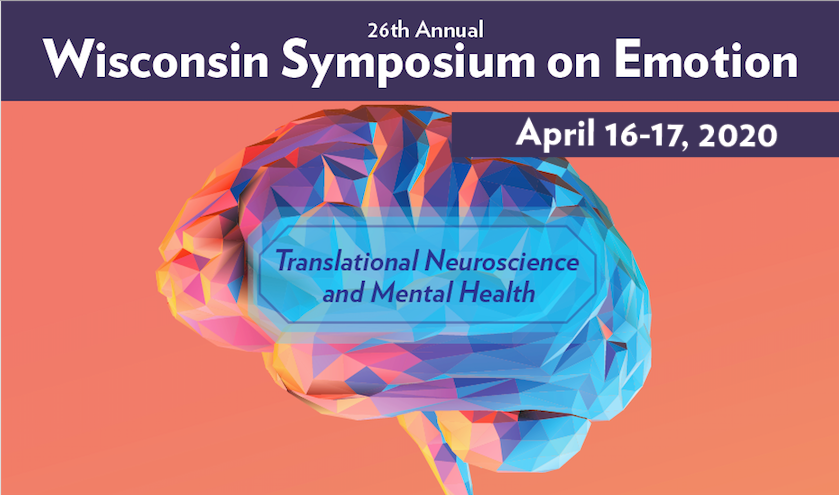“PTSD & Fear: From Neurobiology to Future Prevention and Treatment”
Kerry Ressler, MD, PhD
“PTSD & Fear: From Neurobiology to Future Prevention and Treatment”
Posttraumatic stress disorder (PTSD) manifests after exposure to a traumatic event and is characterized by avoidance/numbing, intrusive symptoms and flashbacks, mood and cognitive disruptions, and hyperarousal/reactivity symptoms. These symptoms reflect dysregulation of the fear system likely caused by poor fear inhibition/extinction, increased generalization, and/or enhanced consolidation or acquisition of fear. These phenotypes can be modeled in animal subjects using Pavlovian fear conditioning, allowing investigation of the underlying neurobiology of normative and pathological fear. Preclinical studies reveal a number of cell-types, systems and circuits critical for aversive learning and memory that have informed the development of therapies used in human clinical trials. In this talk, I will discuss recent evidence for genetic, neurobiological, and neural circuit mechanisms to understanding PTSD. Finally, I’ll discuss neurobiology-driven future approaches to treatments and interventions that have been developed via a bench to bedside translational models.
“Network Psychiatry: Connecting the Dots Between Mood and Cognition”
Olu Ajilore, MD, PhD
“Network Psychiatry: Connecting the Dots Between Mood and Cognition”
Network perspectives on brain function have revolutionized the way we conceptualize psychiatric disorders. This talk will present data on using multimodal neuroimaging techniques to understand how brain network alternations connect mood and cognition, how these network abnormalities respond to treatment, and how novel treatments may be designed to target network dysfunction. We will expand the notion of the “network” to include novel ways to assess mood and cognition using passive sensing with smartphones.
“Precision Neuromodulation”
Alvaro Pascual-Leone, MD, PhD
“Precision Neuromodulation”
In the past decades, neuroimaging techniques such as computerized tomography (CT), magnetic resonance imaging (MRI), positron emission tomography (PET), magneto-encephalography (MEG) and electro- encephalography (EEG) have shaped the way in which we model and understand brain-behavior relations. Anatomical neuroimaging techniques have produced ever more detailed descriptions of the extent of lesions produced by brain injury. Functional neuroimaging methods have revealed associations between various behaviors and patterns of activity in cortical and subcortical structures. Functional MRI and PET can inform us about the location of a brain activity associated with a function, while event related potentials using EEG or MEG can provide information about the timing of a brain activation during a task. Careful design of neuroimaging experiments may allow us to conclude with reasonable certainty that the correlation of brain activity with behavior is likely to be due to a causal connection (i.e. that the brain activity produces the behavior). Nevertheless, imaging alone can never provide proof of that assertion.
The functional units of the brain are ensembles of neurons – brain circuits or networks – which are highly plastic and can be characterized by spatio-temporal signatures of brain activity: patterns of activity across definable brain structures or nodes. Such spatio-temporal signatures represent each thought, behavior, emotion. Alterations of specific spatio-temporal signatures are the substrate of each sign and symptom of disease and thus the neural substrate of disability. Identification and modulation of spatio-temporal signatures of brain activity enables unique causal insights into the neural substrate of brain-behavior relations, and offers the opportunity of highly personalized, precision approaches to neurotherapeutics aimed at addressing symptoms and disabilities.
The use of brain physiology-guided neuromodulation methods to modify brain spatio-temporal signatures of disability can thus offer personalized and targeted therapeutic interventions. A number of noninvasive brain stimulation techniques are being developed to target and modulate brain activity. Particularly transcranial magnetic stimulation (TMS) and transcranial current stimulation (tCS) have become established as valuable neuromodulation tools with diagnostic and therapeutic potential in psychiatry and neurology. TMS and tCS allow us to interfere actively with brain function, and thus investigate the relationship between brain activity and behavior, trace the timing at which a cortical region contributes to a given task, and map the functional connectivity between brain regions. In addition, repetitive TMS and tCS provide means of modifying specific spatio-temporal patterns of brain activity and hence offer precision approaches to modify behavior and treat neuropsychiatric disorders.
However, the knowledge about noninvasive brain stimulation and its diagnostic and therapeutic potential remains limited in the medical community and is distorted by popular press and anecdotal accounts. Optimization of use of noninvasive brain stimulation requires a deeper understanding of neurobiological mechanisms of actions, clear sense of “known-unknowns”, as well as technological developments.
“Approaches to Understanding G X E Interactions Related to Brain–Behavior Development and Psychopathology”
Raquel E. Gur, MD, PhD
“Approaches to Understanding G X E Interactions Related to Brain–Behavior Development and Psychopathology”
The presentation will summarize current efforts that examine neurodevelopmental disorders with associated psychopathology, applying common and rare variants approaches. There are multiple challenges in integrating genomics, neurobiology and environmental factors that impact mental health outcome. Recognizing the complexity and potential steps towards multi-faceted studies of cognitive and socioemotional development will be illustrated. The presentation will include findings from the Philadelphia Neurodevelopmental Cohort, other genomic consortia and work on copy number variants that confer increase risk for mental illness.
“A New Look at Self-Regulation”
Tor Wager, PhD
“A New Look at Self-Regulation”
One of humans’ most important capacities is self-regulation, the ability to use goals and contextual knowledge to influence our feelings, decisions, and sometimes perception and physiology. Early neuroimaging studies suggest that goal-directed regulation of pain and emotion can have substantial impacts on the brain generators of negative affect, particularly the amgydala. However, these studies have been small and subject to potential selection and analytic biases. It remains unclear to what degree humans can regulate responses in core affective brain systems, and what psychological and behavioral ingredients lead to their effective regulation. This talk takes a new look at self-regulation of negative emotion and pain through the lens of comparative effects across over 30 fMRI studies of self regulation and new large-scale fMRI studies (N = 350 on emotion regulation, N = 400 twins on pain regulation) that test established affective neuromarkers.The findings point to different mechanisms from those suspected in the literature, and a need to revise current theories of how self-regulation influences the neural underpinnings of emotion and pain.
“The Burden of Wake and the Reasons for Sleep”
Chiara Cirelli, MD, PhD
“The Burden of Wake and the Reasons for Sleep”
Sleep is universal, tightly regulated, and many cognitive functions are impaired if we do not sleep, including learning and memory, inhibitory control and emotion regulation. But why? I will discuss a comprehensive hypothesis about the core function of sleep – The Synaptic Homeostasis Hypothesis (SHY) – according to which sleep is the price we pay for brain plasticity. During wakefulness the excitatory synapses that allow neurons to communicate with each other undergo net potentiation as a result of learning, an ongoing process that happens all the time while we are awake, constantly adapting to an ever-changing environment. The plasticity of the brain is essential for survival but is also a costly process because stronger synapses increase the demand for energy and cellular supplies, lead to decreases in signal-to-noise ratios, and saturate the ability to learn. According to SHY, while our brain is offline during sleep, neural circuits are reactivated in a neuromodulatory milieu that promotes the renormalization of synaptic strength. This renormalization favors memory consolidation and the integration of new with old memories, and weakens the synapses that contribute more to the “noise” than to the “signal.” Just as crucially, synaptic renormalization during sleep restores the homeostasis of energy and cellular supplies, including many proteins and lipids that are part of the synapses, with beneficial effects at both the systems and cellular level. I will discuss the rationale underlying this hypothesis, summarize studies in flies, rodents and humans that confirmed SHY’s main predictions, and discuss open questions and future challenges.
“Synergistic, Bio-behavioral Interventions to Leverage Neuroplasticity Windows and Improve Emotional Disorders”
Rebecca Price, PhD
“Synergistic, Bio-behavioral Interventions to Leverage Neuroplasticity Windows and Improve Emotional Disorders”
Neural and cognitive processing patterns have been found to distinguish groups of individuals with emotional disorders (e.g., anxiety, depression) from healthy samples, but translating such findings into true advances in clinical care remains a challenge. Research in psychiatry increasingly emphasizes cross-cutting biopsychosocial factors that are heterogeneous within, and across, discrete psychiatric diagnoses. The promise of this work is that it will generate a process-based framework to improve psychiatric assessment and treatment. In this talk, I will discuss neurocognitive factors that may contribute to anxiety and depression across diagnoses, with a focus on impairments in cognitive flexibility and neuroplasticity. I will discuss ongoing attempts to translate such findings into mechanistic treatment strategies and personalized treatment prescriptions capable of remediating neurocognitive disruptions and alleviating symptoms. Specific areas of focus within this work include: 1) characterizing neurocognitive processing patterns in anxiety and depression through behavioral information processing tasks and fMRI; 2) the targeted modification of cognitive processing mechanisms through computer-based training; and 3) leveraging biological treatments (neuromodulation, intravenous ketamine) to acutely enhance neuroplasticity and promote the uptake of adaptive learning.
“Stress, Resilience, and Mental Health: A Neurovisceral Integration Perspective”
Julian Thayer, PhD
“Stress, Resilience, and Mental Health: A Neurovisceral Integration Perspective”
The intimate connection between the brain and the heart via the vagus nerve was enunciated by Claude Bernard over 150 years ago. Darwin in his classic book on the expression of emotion in man and animals also stressed the importance of the vagus nerve. In our neurovisceral integration model we have tried to build on this pioneering work and revive interest in the vagus. We have proposed that vagally-mediated heart rate variability (HRV) is a transdiagnostic marker for psychopathology. Both cross-sectional and longitudinal studies suggest an important role for HRV in the identification of those at risk for psychopathology as well as being a potential marker for treatment outcome. In the present talk I further elaborate our model and update it with recent results. Supportive evidence from recent studies of neuroimaging, fear conditioning, attention, and executive function show that low HRV predicts hypervigilance, poor safety learning, and inefficient allocation of attentional and cognitive resources. In addition, the role of vagal afferents in emotion and fear extinction will be discussed. Importantly, evidence will be presented on the potential role of HRV in resilience to poor outcomes. HRV may provide a transdiagnostic target for the understanding of the etiology as well as the diagnosis and treatment of stress-related mental disorders.
“Directed ACC Signaling Patterns as MDD Biomarker”
Nolan Williams, MD
“Directed ACC Signaling Patterns as MDD Biomarker”
Major Depressive Disorder (MDD) is widely hypothesized to result from disordered communication across brain-wide networks. Yet prior resting state fMRI (rs-fMRI) studies of MDD have studied zero-lag temporal synchrony (functional connectivity) in brain activity absent directional information. We utilize the recent discovery of stereotyped brain-wide directed signaling patterns in humans to conduct the first investigation of the relationship between directed rs-fMRI activity, MDD, and treatment response to a novel FDA-approved neurostimulation paradigm termed Stanford Neuromodulation Therapy (SNT). We find that SNT over left dorsolateral prefrontal cortex (DLPFC) induces directed signaling shifts in the left DLPFC and bilateral anterior cingulate cortex (ACC). Directional signaling shifts in the ACC, but not the DLPFC, predict improvement in depression symptoms, and moreover, pre-treatment ACC signaling predicts both depression severity and the likelihood of SNT treatment response. Taken together, our findings suggest that ACC-based directed signaling patterns in rs-fMRI are a potential biomarker of MDD.
“Imagining Worlds Anew: Social Neuroscience, Master Narratives, and the Cultural Evolution of Morality”
Molly Crockett, PhD
“Imagining Worlds Anew: Social Neuroscience, Master Narratives, and the Cultural Evolution of Morality”
The biologist E.O. Wilson famously ascribed the problems of humanity to “Paleolithic emotions, medieval institutions and godlike technology.” To solve these problems, many suggest we need to understand human emotions and design technology around it — an approach that rests on hidden assumptions about human nature and its capacity for change. This talk will unpack these assumptions and some of their implications. I’ll first discuss evidence from social neuroscience that contradicts dominant cultural narratives of human nature as fundamentally selfish. I’ll then show how, despite this evidence, the myth of self-interest can create self-fulfilling prophecies. In particular, I’ll share studies showing how social media platforms exploit adaptive biases in social learning to amplify outrage and inflate beliefs about intergroup hostility. But such self-fulfilling prophecies are not inevitable. I’ll next share evidence from field studies demonstrating an expanded circle of moral concern in cultural settings that tell a different story about human nature- one that is more aligned with the neuroscientific evidence. I’ll conclude by exploring how people alive today might be able to impact the moral psychology of future generations through the stories we tell about human nature and the technologies we design to share them.
“Dissecting the Neural Circuitry Underlying Motivated Behaviors”
Bo Li, PhD
(note: Dr. Li's talk begins at 11:07 after WSoE Welcome)
The basal ganglia and amygdala circuits have important roles in learning and expression of behavioral responses driven by either appetitive or aversive stimuli. How exactly distinct circuits contribute to the generation of such divergent behavioral responses remains unclear. Our recent studies in mice indicate that reward and punishment based learning induces distinct plastic changes in distributed circuits in the basal ganglia and the amygdala, and reveal how these learning-induced changes can be used to guide flexible behaviors. Here I will report our recent findings regarding the cellular and circuit mechanisms underlying some of the behavioral roles of these distinct circuits.
“Differences in Wellbeing: What Do We Know About Genes, the Brain, and the Environment”
Meike Bartels, PhD
Happiness and wellbeing have emerged as important study subjects within and across many fields of research. A major driving force behind this is the association with physical and mental health and its pivotal role in socioeconomic issues and economic development. With the increased interest in the importance of wellbeing it is critically important to understand and reveal sources of individual differences.
Prof Meike Bartels will present her work on happiness and wellbeing that describing the complex interplay of genetic and environmental factors. She will present the current state of art within the field of behavioral and molecular genetic research into well-being, including twin-family studies and molecular genetic findings and the search for the exposome. She will furthermore explain the importance of her findings for individuals and the society at large.
“Early Emergence of Depression: Understanding Emotion Relevant Risk Factors and Treatment”
Deanna Barch, PhD
This talk with overview research on the psychological and neurobiological risk factors related to emotion processing and regulation that are associated with very early onset depression, with onset as early as preschool. These factors include reduced responses to rewarding outcomes associated with impaired activation of striatal and insular regions, increased responses to negatively valenced outcomes, also associated with disrupted amygdala, striatal and insular activation, impaired emotion regulation associated with decreased prefrontal activity, and disrupted connectivity between emotion reactivity and emotion regulation regions. I will also present results of a novel emotion regulation focused treatment for early onset depression and evidence for modulation of hypothesized neural targets as a function of treatment. Together, these data support the validity of early onset depression, and provide evidence for the emotion relevant psychological and neural factors that can be targeted by treatments and which may serve to identify children at risk for the development of early onset depression.
“Leveraging Community Engagement to Promote Mental Health Equity”
Sidney Hankerson, MD, MBA
African Americans with depression are more impaired, have a longer illness course, and have more severe symptoms compared to White Americans. The purpose of this talk is to briefly review socio-ecological factors that contribute to mental health inequities and describe a novel, church-based depression intervention with a focus on engaging Black men in depression care.
“Toward an Integrated Understanding of Mind-Body Health: From Mechanisms to Interventions”
Melissa Rosenkranz, PhD
This talk will cover the bidirectional interactions between the brain and the immune system, using asthma as a clinical model to investigate the mechanisms that underlie the over-representation of psychopathology and cognitive decline in populations with chronic inflammatory disease. I will present data from a series of brain imaging studies that show that inflammation in the body can modulate neural responses to emotion and that neural responses to emotion can modulate inflammation in the body, with clinically meaningful consequences. I’ll also share work demonstrating that mental training can have descending impact on peripheral inflammation and disease-related outcomes. Finally, I’ll advance the hypothesis that the relationship between emotion and inflammation may portend a more fundamental neurodegenerative process, giving rise a range of poor outcomes, including dementia.
"Model Organism Approaches to Anxiety and Emotion"
"Preconception Delivery: Somatic Signals Impacting Neurodevelopment and Stress Circuitry”
Tracy Bale, PhD
"Preconception Delivery: Somatic Signals Impacting Neurodevelopment and Stress Circuitry”
April 14, 2021
"A Neural Circuitry Substrate for Cognitive Dysfunction in Schizophrenia"
David Lewis, MD
"A Neural Circuitry Substrate for Cognitive Dysfunction in Schizophrenia"
April 14, 2021
"Probing Modulation in Extended Amygdala Circuits"
"Dissecting Neurobiological Mechanisms of ASD from Genes to Circuits"
Guoping Feng, PhD
"Dissecting Neurobiological Mechanisms of ASD from Genes to Circuits"
April 14, 2021
2021 All Presenter Discussion
2021 All Presenter Discussion
Wisconsin Symposium on Emotion 2021: Translational Neuroscience & Mental Health
April 14, 2021
Presenters:
Ned Kalin, MD
Richard Davidson, PhD
Guoping Feng, PhD
Thomas Kash, PhD
David Lewis, MD
Tracy Bale, PhD
Joshua Gordon, MD, PhD




















